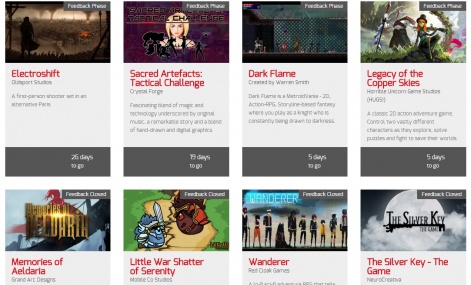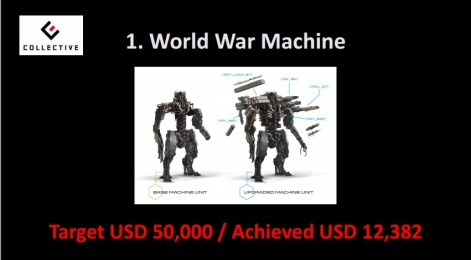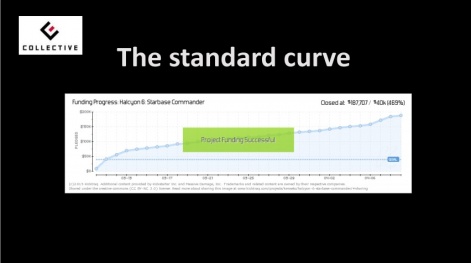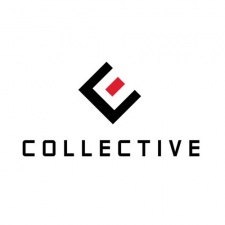“I created the concept for Collective internally about 2 years ago and we started it about 15 months - it's very much my baby,” says Phil Elliott at Develop:Brighton 2015.
Elliot is the Square Enix Collective Project Lead - formerly a journalist for Gamespot, GamesIndustry.biz and BBC 5Live - and the man who's pioneered indie dev relations at Square Enix.
The idea behind the Square Enix Collective is to provide a platform for indie developers to get feedback and, dependent on the player response, perhaps move towards a Square Enix-backed crowdfunding campaign.
Open arms
“The reason for creating Collective in the first place was to see if we could support, with our business, smaller teams particularly going through crowdfunding," says Elliott.
"It doesn't really cost us anything to open up our comms channels, so we thought we'd try to do something to give something back to the gaming community - not something you hear very often from traditional publishers.
“Discoverability is important, so once a project goes live we then drive traffic to that... we bring users from the Square Enix community to see these projects.”

“For some projects we may offer to support through a crowdfunding campaign," he continues.
"But we can only do one of those very six to eight weeks, as opposed to the feedback phase which takes place once per week.”
When it comes to the crowdfunding campaigns, the Collective is very cautious about how far it gets involved with the products - and is keen for them to remain very much the property of the developer, unlike with traditional publishing.
If something looks popular, it's self-perpetuating.Phil Elliot
“The basic template is QA, launch support - which includes PR - but we don't touch IP... marketing is another one that people are always interested in, but again it's entirely optional," Elliott says.
"[IP is] important to us, because we think it helps developers to build their own futures... that's where creativity can be encouraged.”
“And for us, it's very important that there are options for new talent, as a strong industry is as beneficial for Square Enix as it is for everyone else.”
Trust
The Square Enix Collective's belief in the power of IP goes two ways, too. As well as allowing developers to maintain their own IP when signing up to the program, Square Enix has also opened up three of its out-of-use IPs - Gex, Anachronox, and Fear Effect - for pitching by indie developers.
“Pretty much all the teams we work with don't have a track record, and no known IP, so we think [our trust in them] is important to people,” says Elliott.
Developers' trust in the Square Enix Collective, however, has not always been proven well-placed. World War Machine, one of the earliest games to have a campaign coordinated by the Square Enix Collective, raised a mere 25 percent of its target.

“It was a desperate time for me, so I can only imagine what it was like for the dev team. We drove a lot of traffic to the campaign, but we learned a lot and I think if we did it today it would have succeeded,” Elliott reflects.
And, several successful campaigns later, he and his team have learned a lot about crowdfunding. One of his major tips is the psychological power of the dollar, recommending crowdfunding in the US and Canadian dollar ahead of GBP:
“Simply, it moves quicker - the numbers tick up more quickly... and crowdfunding is a very psychological process,” he says.
And indeed, he suggests that the impression of having momentum is incredibly important: “If something looks popular, it's self-perpetuating.”
Floppy middle
Campaigns that succeed, he observes, usually follow a trajectory whereby roughly 40 percent of the funding goal is reached in the first 48 hours, and another 40 percent in the final 48 hours - meaning that the funding level effectively flatlines for the majority of the campaign.
If you go beyond that initial 48 hours without gaining traction, it will be incredibly hard to get your campaign back on track - and if you're banking on the press to bail you out, you may be barking up the wrong tree.
“Press is definitely important, but not in the way we expected," says Elliott. "We sort of thought, because we're Square Enix, we could send out a press release and everyone would write about it.”

“[But] readers are increasingly fed up with games that might never come out - and the scams don't help... so the press are wary.”
Crowdfunding, then, remains an incredibly difficult prospect - even for Square Enix. But Phil Elliott's Collective is beginning to accrue a tidy little collection of success stories.
And so, for developers considering that path, the Square Enix Collective should at least make the journey a little less risky.
You can learn more about the Square Enix Collective on its website.






















